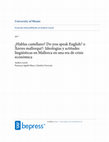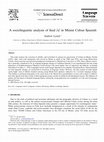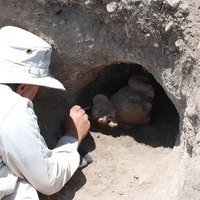Papers by Andrew Lynch
Social Factors and Language Proficiency in Postsecondary Spanish Immersion: Issues and Implications
Hispania, 2001

Studies in Hispanic and Lusophone Linguistics, 2017
ResumenDesde 2011 hasta 2015, el presidente del gobierno de las Illes Balears llevó a cabo una se... more ResumenDesde 2011 hasta 2015, el presidente del gobierno de las Illes Balears llevó a cabo una serie de reformas lingüísticas con el supuesto objetivo de abrir las puertas del mercado laboral local y global a la población balear. En reacción a estas políticas, una parte significativa de la población balear salió a la calle acusando al gobierno de enmascarar un ataque a la lengua catalana. A partir de un análisis cuantitativo y cualitativo de datos de 316 encuestas a residentes y 20 entrevistas personales, examinamos las actitudes e ideologías que la población mallorquina alberga respecto al conflicto lingüístico más reciente, las cuales se manifiestan irremediablemente ligadas a la crisis económica existente en el periodo. Subrayamos la percepción del valor económico del inglés y del castellano frente al catalán o a la variedad regional mallorquina en plena crisis económica del país.
Heritage Language Journal, 2003
This article presents questions and areas of inquiry that should be pursued in Heritage Language ... more This article presents questions and areas of inquiry that should be pursued in Heritage Language Acquisition based on what has been done in Second Language Acquisition. Linguistic, social and educational issues are highlighted, and important parallels are made between the two fields.
The boundaries of Anglicisms
Spanish in Miami
The effects of explicit instruction on written accent mark usage in basic and intermediate Spanish heritage language courses
Journal of Spanish Language Teaching

Native Speakerhood in Heritage Language Research
This chapter provides an overview of heritage language (HL) research in relation to native speake... more This chapter provides an overview of heritage language (HL) research in relation to native speakerhood. The variation across HL speakers who range from overhearers to highly proficient individuals often indistinguishable from native speakers (NSs) is one of the greatest challenges faced by the field. We suggest that, on sociolinguistic grounds, much remains to be said about the acquisition and awareness of sociolinguistic variants in the HL; speaker agency and identities; “passing” as native in terms of contextually-situated language performativity; the role of ideologies in HL settings; community engagement and service-learning, and L2-HL learner interactions in the classroom. From the perspective of grammatical systems, more work needs to be done to distinguish effects of processing difficulties or memory limitations from more profound innovations in HL grammars. We argue that despite their knowledge gaps, HL speakers have much in common with NSs, and with appropriate instruction ...
Otros países de ámbito hispánico
Enciclopedia Del Espanol En Los Estados Unidos Anuario Del Instituto Cervantes 2008 2008 Isbn 978 84 88252 90 6 Pags 135 139, 2008
La demografía hispánica en suelo norteamericano: Otros países de ámbito hispánico; ‘Latinos’ e hispanohablantes: Otras procedencias
The first decade of the Heritage Language Journal: A retrospective view of research on heritage languages
Heritage Language Journal, 2014
Language and Linguistics Compass, 2015
In this paper, we discuss current trends in sociolinguistic work focusing on language in metropol... more In this paper, we discuss current trends in sociolinguistic work focusing on language in metropolitan Miami, an area we contend is underrepresented in the sociolinguistics literature given the unique contact situation that has arisen there during the past half century. We focus our attention on four main areas of theoretical and empirical concern: (1) Spanish-English bilingualism, (2) issues related to the varieties of Spanish spoken in Miami, (3) issues related to the varieties of English spoken in Miami, and (4) an overview of languages other than English and Spanish spoken in the region, with particular attention to Haitian Creole. We conclude with suggestions for future sociolinguistic work in all of these areas.

La valoración del habla bilingüe en los Estados Unidos: Fundamentos sociolingüísticos y pedagógicos en Hablando bien se entiende la gente
Hispania, 2014
ABSTRACT Resumen: Para muchas personas e instituciones, la Academia de la Lengua Española se cons... more ABSTRACT Resumen: Para muchas personas e instituciones, la Academia de la Lengua Española se considera una máxima autoridad en materia de lengua española y ejerce una fuerte influencia en la percepción y apreciación lingüísticas a través del mundo hispánico. La Academia Norteamericana de la Lengua Española (ANLE), la más nueva de las 22 academias que conforman la Asociación de Academias de la Lengua Española, puede jugar un papel fundamental en la normalización del español en los Estados Unidos en años venideros, especialmente en los terrenos político e institucional. En este artículo examinamos desde un punto de vista crítico el libro Hablando bien se entiende la gente, una guía escrita por el director y varios miembros de la ANLE como un “esfuerzo de servicio comunitario realizado en aras del buen decir”, según los autores, con el propósito de “despejar dudas ortográficas y gramaticales”. Señalamos la problemática conceptualización sociolingüística del libro y argumentamos que la voz pedagógica que se manifiesta en sus páginas podría ser contraproducente para lo que debe ser la principal función de la ANLE: promover el uso del español en los Estados Unidos.

Language Sciences, 2009
This study analyzes the variation of syllable-and word-final /s/ among two generations of Cubans ... more This study analyzes the variation of syllable-and word-final /s/ among two generations of Cubans in Miami, Florida (USA): older, early exile immigrants who arrived in Miami as adults in the 1960s and 1970s, and young Miami-born Cubans whose maternal and paternal grandparents immigrated to Miamifrom Cuba prior to 1980. Since sibilant weakening is generally considered to be an ongoing language change in Caribbean Spanish, it was hypothesized that the young generation of English-dominant bilinguals would present with much higher rates of aspiration and deletion, in keeping with [Silva-Corvalán, C., 1994. Language Contact and Change. Spanish in Los Angeles. Clarendon Press, Oxford] hypothesis that linguistic changes are accelerated in situations of language contact. However, the data instead revealed significantly higher rates of sibilant retention among young Miami-born speakers, indicative of a 'reversed' language change. This finding is attributed principally to the social need of the Miami-born grandchildren of early exile Cubans to differentiate their speech from that of later Cuban immigrant groups, mostly for political and ideological reasons. The influence of gender and the impact of Spanish language fluency among the young generation are considered, as is the role of languageinternal factors.
Estudio comparativo de actitudes hacia el español en los Estados Unidos: educación, política y entorno social
Lingüística española actual, 2005
... Pero hay que destacar que el comportamiento aceptación o rechazo es reflejo de las actitude... more ... Pero hay que destacar que el comportamiento aceptación o rechazo es reflejo de las actitudes como producto de ... factores políticos, sociales y psicoló- gicos que condicionan la adquisición y el uso de segundas lenguas y, en si-tuaciones de contacto, el mantenimiento ...
Transcription adapted from the roundtable discussion held at the Cervantes Institute at Harvard U... more Transcription adapted from the roundtable discussion held at the Cervantes Institute at Harvard University (Observatory of the Spanish Language and Hispanic Cultures in the United States) on September 21, 2017.
Transcripción adaptada de la mesa redonda celebrada en el Instituto Cervantes en la Universidad d... more Transcripción adaptada de la mesa redonda celebrada en el Instituto Cervantes en la Universidad de Harvard (Observatorio de la lengua española y las culturas hispánicas en los Estados Unidos) el día 21 de septiembre de 2017.
Language Variety in the New South: Contemporary Perspectives on Change and Variation (eds Jeffrey Reaser, Eric Wilbanks, Karissa Wojcik, Walt Wolfram), 2018
1. Introducing "the South" as a linguistic region
2. Miami before and after the Cuban Revolution... more 1. Introducing "the South" as a linguistic region
2. Miami before and after the Cuban Revolution
3. English in Miami: Is it Southern?
4. Spanish in Miami: What is its "Place"?
5. Conclusions
Citation:
Langauge Variety in the New South: Contemporary Perspectives on Change and Variation (eds Jeffrey Reaser, Eric Wilbanks, Karissa Wojcik, Walt Wolfram). UNC Press, Chapel Hill, North Carolina. pos 306-320
Language and Linguistics Compass 9: 369-385, Sep 16, 2015
In this paper, we discuss current trends in sociolinguistic work focusing on language in metropol... more In this paper, we discuss current trends in sociolinguistic work focusing on language in metropolitan
Miami, an area we contend is underrepresented in the sociolinguistics literature given the unique contact
situation that has arisen there during the past half century. We focus our attention on four main areas of
theoretical and empirical concern: (1) Spanish–English bilingualism, (2) issues related to the varieties of
Spanish spoken in Miami, (3) issues related to the varieties of English spoken in Miami, and (4) an overview
of languages other than English and Spanish spoken in the region, with particular attention to
Haitian Creole. We conclude with suggestions for future sociolinguistic work in all of these areas.
Publications by Andrew Lynch

Percepciones latinxs del cruce lingüístico en textos literarios: el reto de la (pos)modernidad en los Estados Unidos
Revista Letral, 2022
RESUMEN
Los cruces lingüísticos en la producción literaria latino-caribeña desarrollan en los est... more RESUMEN
Los cruces lingüísticos en la producción literaria latino-caribeña desarrollan en los estudiantes de español como lengua de herencia (ELH) una conciencia de los valores socioculturales y pragmáticos del discurso multilingüe. Ben Rampton argumenta que los cruces lingüísticos desestabilizan identidades étnicas tal como se conceptualizan en discursos públicos y político-normativos en espacios globalizados (2000). Partiendo de esta base teórica, el presente estudio planteó una serie de cuestiones a estudiantes de ELH en respuesta a una variedad de extractos de textos literarios latinos y caribeños que contienen español e inglés. Los hallazgos generales sugieren que, a pesar de que estos textos cuestionan los límites discursivos de las definiciones tradicionales de ‘lo americano’ y ‘lo cari- beño’ en lo que se refiere a demarcaciones lingüísticas y cánones literarios, mu- chos de estos hablantes en los EUA proyectan una visión en gran medida monolingüe y monolítica en lo que se refiere a identidades nacionales y etnolin- güísticas.
Palabras clave: literatura latina y caribeña; cruce lingüístico; percepciones; español como lengua de herencia.
ABSTRACT
Language crossings in Latinx-Caribbean artistic production provide an oppor- tunity for students of Spanish as a heritage language (HL) to reflect upon con- ventional uses of Spanish and English and develop awareness of the cultural and pragmatic value of code-mixed discourse. Ben Rampton argues that language crossing destabilizes ethnic identity as most often conceptualized in public and policy discourses in globalized spaces (2000). The present survey study drew on Rampton’s proposal and posed general questions to Spanish HL learners in re- sponse to a variety of excerpts of US Latina and Caribbean literary texts that contain English and Spanish. The overall findings suggest that, although these texts may contest conventional notions of mainstream Caribbean, American, and US Latinx discourses in terms of language boundaries and literary canons, HL speakers of Spanish in the US tend to project a largely monolingual and monolithic vision of language in relation to national and ethnolinguistic identity.
Keywords: Latina and Caribbean literature, language crossing, perceptions, Spanish as a heritage language.











Uploads
Papers by Andrew Lynch
2. Miami before and after the Cuban Revolution
3. English in Miami: Is it Southern?
4. Spanish in Miami: What is its "Place"?
5. Conclusions
Citation:
Langauge Variety in the New South: Contemporary Perspectives on Change and Variation (eds Jeffrey Reaser, Eric Wilbanks, Karissa Wojcik, Walt Wolfram). UNC Press, Chapel Hill, North Carolina. pos 306-320
Miami, an area we contend is underrepresented in the sociolinguistics literature given the unique contact
situation that has arisen there during the past half century. We focus our attention on four main areas of
theoretical and empirical concern: (1) Spanish–English bilingualism, (2) issues related to the varieties of
Spanish spoken in Miami, (3) issues related to the varieties of English spoken in Miami, and (4) an overview
of languages other than English and Spanish spoken in the region, with particular attention to
Haitian Creole. We conclude with suggestions for future sociolinguistic work in all of these areas.
Publications by Andrew Lynch
Los cruces lingüísticos en la producción literaria latino-caribeña desarrollan en los estudiantes de español como lengua de herencia (ELH) una conciencia de los valores socioculturales y pragmáticos del discurso multilingüe. Ben Rampton argumenta que los cruces lingüísticos desestabilizan identidades étnicas tal como se conceptualizan en discursos públicos y político-normativos en espacios globalizados (2000). Partiendo de esta base teórica, el presente estudio planteó una serie de cuestiones a estudiantes de ELH en respuesta a una variedad de extractos de textos literarios latinos y caribeños que contienen español e inglés. Los hallazgos generales sugieren que, a pesar de que estos textos cuestionan los límites discursivos de las definiciones tradicionales de ‘lo americano’ y ‘lo cari- beño’ en lo que se refiere a demarcaciones lingüísticas y cánones literarios, mu- chos de estos hablantes en los EUA proyectan una visión en gran medida monolingüe y monolítica en lo que se refiere a identidades nacionales y etnolin- güísticas.
Palabras clave: literatura latina y caribeña; cruce lingüístico; percepciones; español como lengua de herencia.
ABSTRACT
Language crossings in Latinx-Caribbean artistic production provide an oppor- tunity for students of Spanish as a heritage language (HL) to reflect upon con- ventional uses of Spanish and English and develop awareness of the cultural and pragmatic value of code-mixed discourse. Ben Rampton argues that language crossing destabilizes ethnic identity as most often conceptualized in public and policy discourses in globalized spaces (2000). The present survey study drew on Rampton’s proposal and posed general questions to Spanish HL learners in re- sponse to a variety of excerpts of US Latina and Caribbean literary texts that contain English and Spanish. The overall findings suggest that, although these texts may contest conventional notions of mainstream Caribbean, American, and US Latinx discourses in terms of language boundaries and literary canons, HL speakers of Spanish in the US tend to project a largely monolingual and monolithic vision of language in relation to national and ethnolinguistic identity.
Keywords: Latina and Caribbean literature, language crossing, perceptions, Spanish as a heritage language.
2. Miami before and after the Cuban Revolution
3. English in Miami: Is it Southern?
4. Spanish in Miami: What is its "Place"?
5. Conclusions
Citation:
Langauge Variety in the New South: Contemporary Perspectives on Change and Variation (eds Jeffrey Reaser, Eric Wilbanks, Karissa Wojcik, Walt Wolfram). UNC Press, Chapel Hill, North Carolina. pos 306-320
Miami, an area we contend is underrepresented in the sociolinguistics literature given the unique contact
situation that has arisen there during the past half century. We focus our attention on four main areas of
theoretical and empirical concern: (1) Spanish–English bilingualism, (2) issues related to the varieties of
Spanish spoken in Miami, (3) issues related to the varieties of English spoken in Miami, and (4) an overview
of languages other than English and Spanish spoken in the region, with particular attention to
Haitian Creole. We conclude with suggestions for future sociolinguistic work in all of these areas.
Los cruces lingüísticos en la producción literaria latino-caribeña desarrollan en los estudiantes de español como lengua de herencia (ELH) una conciencia de los valores socioculturales y pragmáticos del discurso multilingüe. Ben Rampton argumenta que los cruces lingüísticos desestabilizan identidades étnicas tal como se conceptualizan en discursos públicos y político-normativos en espacios globalizados (2000). Partiendo de esta base teórica, el presente estudio planteó una serie de cuestiones a estudiantes de ELH en respuesta a una variedad de extractos de textos literarios latinos y caribeños que contienen español e inglés. Los hallazgos generales sugieren que, a pesar de que estos textos cuestionan los límites discursivos de las definiciones tradicionales de ‘lo americano’ y ‘lo cari- beño’ en lo que se refiere a demarcaciones lingüísticas y cánones literarios, mu- chos de estos hablantes en los EUA proyectan una visión en gran medida monolingüe y monolítica en lo que se refiere a identidades nacionales y etnolin- güísticas.
Palabras clave: literatura latina y caribeña; cruce lingüístico; percepciones; español como lengua de herencia.
ABSTRACT
Language crossings in Latinx-Caribbean artistic production provide an oppor- tunity for students of Spanish as a heritage language (HL) to reflect upon con- ventional uses of Spanish and English and develop awareness of the cultural and pragmatic value of code-mixed discourse. Ben Rampton argues that language crossing destabilizes ethnic identity as most often conceptualized in public and policy discourses in globalized spaces (2000). The present survey study drew on Rampton’s proposal and posed general questions to Spanish HL learners in re- sponse to a variety of excerpts of US Latina and Caribbean literary texts that contain English and Spanish. The overall findings suggest that, although these texts may contest conventional notions of mainstream Caribbean, American, and US Latinx discourses in terms of language boundaries and literary canons, HL speakers of Spanish in the US tend to project a largely monolingual and monolithic vision of language in relation to national and ethnolinguistic identity.
Keywords: Latina and Caribbean literature, language crossing, perceptions, Spanish as a heritage language.